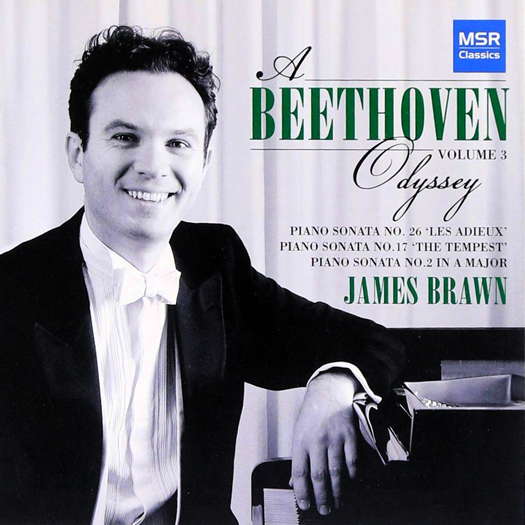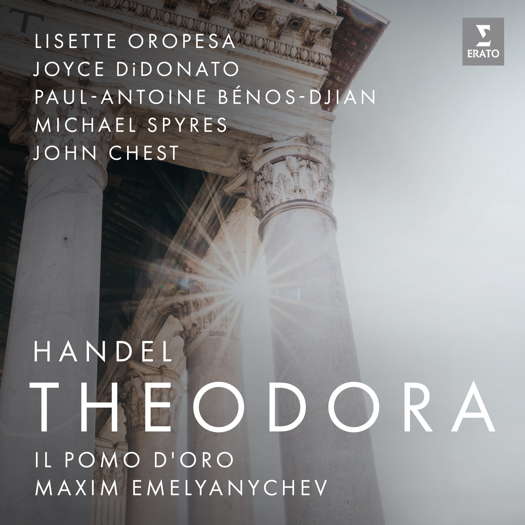 SPONSORED: CD Spotlight. Masterful Handling - Volume 3 of James Brawn's Beethoven, praised by Andrew Schartmann.
SPONSORED: CD Spotlight. Masterful Handling - Volume 3 of James Brawn's Beethoven, praised by Andrew Schartmann.
All sponsored features >>
 FEEDBACK: She said WHAT? Read what people think about our Classical Music Daily features, and have your say!
FEEDBACK: She said WHAT? Read what people think about our Classical Music Daily features, and have your say!
 VIDEO PODCAST: Slava Ukraini! - recorded on the day Europe woke up to the news that Vladimir Putin's Russian forces had invaded Ukraine. Also features Caitríona O'Leary and Eric Fraad discussing their new film Island of Saints, and pays tribute to Joseph Horovitz, Malcolm Troup and Maria Nockin.
VIDEO PODCAST: Slava Ukraini! - recorded on the day Europe woke up to the news that Vladimir Putin's Russian forces had invaded Ukraine. Also features Caitríona O'Leary and Eric Fraad discussing their new film Island of Saints, and pays tribute to Joseph Horovitz, Malcolm Troup and Maria Nockin.

A Glorious Masterpiece
GERALD FENECH listens to Handel's 'Theodora'
'Joyce di Donato and Michael Spyres ... are truly impressive in their interpretations of the title roles full of overwhelming commitment and audacious singing virtuosity.'
George Friderich Handel (1685-1759) wrote Theodora during his last period of composition. He was sixty-four when he began working on it in June 1749, and during the previous year he had written the oratorios Solomon and Susanna. Theodora would be his penultimate work in the genre. It differs from the former two because it is a tragedy, ending in the death of the heroine and her converted lover. It is also Handel's only dramatic oratorio in English on a Christian subject.
Listen — Handel: Overture (Theodora)
(5054197177910 CD1 track 1, 0:00-0:37) ℗ 2022 Parlophone Records Limited :
The libretto was the work of Thomas Morell (1703-1784), who had worked with Handel before on several oratorios. Indeed, he and the composer were close friends, and when Handel died he left the librettist two hundred pounds in his will. Theodora was finished on 31 July 1749, and the premiere took place on 16 March 1750. Sadly, the piece was a failure and was only performed on three occasions. There are at least two explanations for this. Firstly, the theme of the persecution and martyrdom of a Christian saint may have been too removed from the Old Testament narratives that Londoners had become accustomed to from Handel's dramatic oratorios. The other reason might have been the occurrence of an earthquake, about a week before the premiere, that caused some of Handel's usual patrons to flee the city. It was the least performed of all his oratorios, being revived only once in 1755.
Theodora was actually Handel's favourite of all his oratorios, and the composer rated the final chorus of Part II, 'He saw the lovely youth', far beyond 'Hallelujah' in The Messiah.
Listen — Handel: He saw the lovely youth (Theodora Part II)
(5054197177910 CD2 track 26, 0:00-1:00) ℗ 2022 Parlophone Records Limited :
The backdrop to the story is Antioch in the Fourth century AD. Valens, the Roman governor, issues a decree in honour of Diocletian's birthday, demanding that all citizens offer sacrifices to Venus, the Roman goddess of love, and Flora, a fertility goddess of spring. Those who refuse will be executed. Valens puts Septimius in charge of this ordeal. Didymus, a soldier secretly converted to Christianity, implores Valens to spare those whose conscience prevents them from making sacrifices, but the former flatly denies this concession. Septimius suspects that Didymus is a Christian while affirming his own loyalty to the law. Still, he is all the same moved to pity for those about to die, and wishes he could extend mercy to them. Meanwhile, as Theodora, a nobly born Christian, and her friend Irene are worshipping in private with other believers, Septimius enters and arrests them. Although Theodora is prepared to die, to her immense pain, she is sentenced to serve as a prostitute in the temple of Venus. Irene informs Didymus of this, and he rushes to the temple with the hope of rescuing his beloved or else die with her. This first part closes with a chorus of Christians praying for Didymus to succeed.
Listen — Handel: Go, gen'rous, pious youth (Theodora Part I)
(5054197177910 CD1 track 30, 0:18-1:17) ℗ 2022 Parlophone Records Limited :
Part II opens with the festival in honour of the emperor and goddesses in full swing. Valens sends Septimius to tell Theodora that if she does not join the feast by the end of the day he will send his guards to rape her. Theodora is frightened, but the thought of the afterlife sustains her. Septimius, who by now is well aware of Didymus's conversion, allows the latter to visit Theodora. The girl implores her lover to kill her, rather than face the ignominy of defilement, but Didymus persuades her to conceal her identity by putting on his helmet and uniform and escaping, leaving him in her place. Meanwhile, Irene and the Christians pray to God that if the lovers were to die, they would be rewarded by a new and eternal life in heaven.
The Third Part opens with the Christians celebrating Theodora's return. However, she feels guilty that she had to put Didymus's life in danger to save her own. News arrives of Didymus's capture and that Valens has condemned Theodora to death. As the execution nears, Theodora enters, demanding that she die instead of her lover. Both argue that they should die in place of the other, an act that moves Septimius to plead for clemency. Valens refuses, and as the lovers walk to their sacrifice, they sing a duet in praise of immortality.
Listen — Handel: Streams of pleasure ever flowing (Theodora Part III)
(5054197177910 CD3 track 20, 4:33-5:33) ℗ 2022 Parlophone Records Limited :
In this day and age of incredulity this story may sound rather silly to many, but in Handel's time these heroics were taken very seriously. Indeed, in the first centuries of Christianity, such persecutions were rife, but they were also the flame that kept the faith alight, even up to our own times. I, for one, still identify myself with that loyalty of belief that stood firm in the face of Roman barbarity.
Despite its commercial failure, Theodora is the most perfectly balanced oratorio of his later years, and the music is consistently dramatic, impassioned and gorgeously melodic. Emelyanychev's animated conducting draws some electrifying performances full of emotional fervour and profound reverence.
Joyce di Donato and Michael Spyres, in particular, are truly impressive in their interpretations of the title roles full of overwhelming commitment and audacious singing virtuosity. Indeed, Theodora and Didymus have been brought back to life again.
This is an important addition to the Handel discography, in pristine sound quality and informative booklet notes that I warmly recommend, especially to those that are still unacquainted with this glorious masterpiece.
Copyright © 10 October 2022
Gerald Fenech,
Gzira, Malta

CD INFORMATION - HANDEL: THEODORA


